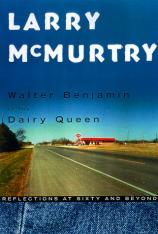Walter Benjamin at the Dairy Queen: Reflections at Sixty and Beyond
Review
Walter Benjamin at the Dairy Queen: Reflections at Sixty and Beyond
An essay called "The Storyteller" by Walter Benjamin prompted Larry
McMurtry to ponder the role of the oral storyteller in our modern
world and in the lonely world of Texas his pioneer grandparents
faced in the late 1800s. These ponderings, along with
his thoughts on memory, writing, his grandparents and his parents,
his upbringing, reading, book collecting, and the American West,
give us a compelling look into the mind of one of America's more
original writers.
A storyteller himself, although not of the oral variety, McMurtry
finds it fitting that his first foray into Benjamin's work took
place at the local Dairy Queen:
"Dairy Queens, simple drive-up eateries, taverns without alcohol,
began to appear in the arid little towns of west Texas about the
same time (the late sixties) that Walter Benjamin's work began to
arrive in the English language --- in the case of Illuminations,
beautifully introduced by Hannah Arendt. The aridity of
the small west Texas towns was not all a matter of unforgiving
skies, baking heat, and rainlessness, either; the drought in those
towns was social, as well as climatic. The extent to
which it was moral is a question we can table for the
moment. What I remember clearly is that before the Dairy
Queens appeared the people of the small towns had no place to meet
and talk; and so they didn't meet or talk, which meant that much
local lore or incident remained private and ceased to be exchanged,
debated, and stored as local lore had been during the centuries
that Benjamin describes."
McMurtry undertakes a critical look at Benjamin's theory on the
role of oral storytelling. A culture vastly different
from the European forum with which Benjamin was used to dealing,
the thinly settled American West was not especially suited to
storytelling. " . . . what kind of stories arise in a
place where nothing has ever happened except, of course, the
vagaries and vicissitudes of individual life?" Using
that question as a springboard for other discussions, McMurtry
begins to recall the stories he heard as a child.
These essays flow into one another, sometimes individually reasoned
and presented, sometimes seeming more like chapters in a book that
merely continues a theme from one context to another, but always
fleshed out with memory and experience. The essays
provide glimpses into Larry McMurtry as he was formed by his
childhood, his family, and his determination not to be a cattleman
like his father and his grandfather. As for his present
situation, McMurtry refreshingly offers little in the way of
titillation. While he discusses his community and his
role in it as an antiquarian bookseller, as well as his experiences
as a heart patient, McMurtry eschews patently private areas,
including discussions of his children or the women in his
life.
Written in a sort of stream-of-consciousness style, WALTER BENJAMIN
AT THE DAIRY QUEEN is not without the trademark McMurtry plain
speaking. Some of the more interesting pieces focus on
the romanticism of the American West, which he abhors and to which
he feels other writers and photographers have contributed.
"Despite photographic evidence, economic evidence, and human
evidence, it was in the main the poeticized, pastoral West that
registered in the public eye. Realistic, even
naturalistic evidence was ignored when possible. The
increasing poverty and marginality of the tribal people is fully
documented, and yet, as has so often been the case in America,
reality has proven to be no match for
salesmanship."
Rare book hunting, book shelving a la Susan Sontag, the reading of
Proust and Virginia Woolf, and McMurtry's realization that with
"word herding" he hasn't come so far from cattle ranching at that,
help personalize the book even further without trivializing
it.
WALTER BENJAMIN AT THE DAIRY QUEEN is a reflective look at life and
storytelling by arguably the best storyteller of the American West
to date. Thought-provoking and insightful, this is a
collection of essays that will forge its way into the hearts and
minds of McMurtry fans, aficionados of the American West, and
readers and book lovers of all types.
Reviewed by Jami Edwards on January 24, 2011
Walter Benjamin at the Dairy Queen: Reflections at Sixty and Beyond
- Publication Date: November 5, 1999
- Genres: Fiction
- Hardcover: 208 pages
- Publisher: Simon & Schuster
- ISBN-10: 0684854961
- ISBN-13: 9780684854960





